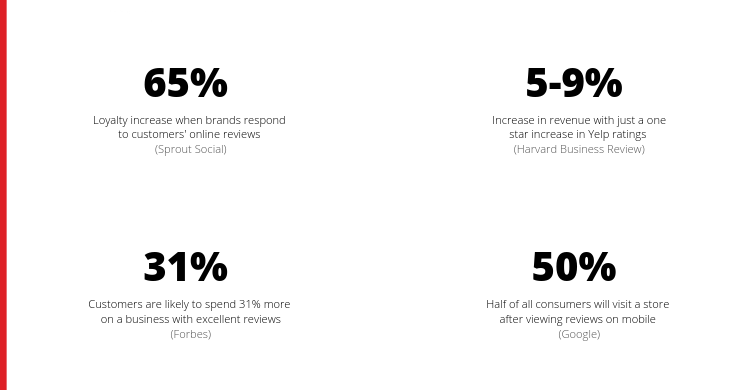Hot Springs, VA - For a second consecutive year, Michael Sahouri and Dave Ciccarelli were invited by the Community Associations Institute (CAI) to address business and community leaders at the Annual Virginia Leadership Retreat (VLR).
This year's topic: Navigating the Stormy Seas of Online Anger Management. This post will summarize the discussion.
What you will learn:
- Introducing Online Review Platforms
- The Business Impact of Online Reviews
- Challenges for Business Owners
- Online Reputation Management
- Virginia Leadership Retreat Snapshot
Online Review Platforms.
Online review platforms such as Yelp, Google Reviews, and Glassdoor have revolutionized how consumers and professionals communicate and share feedback about the products, services and institutions we interact with.
Reviews help companies increase online visibility, build trust with stakeholders, and ultimately self-generate new business opportunities. In turn, online reviews help consumers evaluate products/services based on the experiences of others to ultimately purchase, or not to purchase something.
Consumers have never been more dependent on online reviews.
According to RevLocal, online review engagement has increased by 88% since 2014. At any given moment, an interested party is filtering through your company's reviews. Potential clients are making first impressions, forming judgements and coming to buying decisions based on feedback left by others.
The Impact On Your Bottom Line.
Like many social media platforms, crowd-sourced review sites can have positive and/or negative impacts on your business' bottom line. A dabble of a keyboard and a click of a button can help you win business. It can also cost you some potential buyers as well.
According to a study by Moz, one negative review can sway 20% of potential customers from a purchase. Three negative reviews increases loss potential to 59% and as high as 70% when four or more negative reviews are found.
.png?width=738&name=When%20you%20are%20doing%20research%20for%20a%20product%20or%20service%20youre%20going%20to%20buy,%20how%20many%20negative%20articles%20does%20it%20take%20for%20you%20to%20decide%20to%20not%20buy%20that%20product%20or%20service_%20(2).png)
On a positive note, effective review platforms help boost brand recognition and word of mouth marketing. By way of increased invisibility and online search ranking, positive reviews can also increase your sales opportunities!
Positive reviews invite new buyers, increase their loyalty, and even help existing customers refer your business with confidence.

Challenges for Business Owners.
We asked 10 business owners about their challenges with online reviews. The consensus: not being present when it matters most. It is frustrating for a business owner to realize that they are powerless when someone is in the process of writing a critical review. Nothing can be done to put out that fire before it makes "the news."
If the feedback was provided "old school," over the phone or in-person, a business owner can step in and save the day. Today, consumers have the luxury of sending criticism anywhere and anytime, leaving business owners constantly on edge.
Naturally, businesses prefer to control the narrative on their products or services. This is especially true since anyone with internet access can cause damage to the reputation of a business, its owner(s), or staff.
The impact is clear, but online review credibility is debatable.
The overwhelming majority of consumers posting online reviews are not professional critics. The result? Like Sahouri Insurance and Sentry Management have experienced, many negative reviews are cases of responsibilities misunderstood.
If your company operates as a conduit between two parties, you are bound to face heat from both sides, regardless of where the responsibility lies.
Even freelancers experience the challenge of misinformed reviews online:
.png?width=738&name=When%20you%20are%20doing%20research%20for%20a%20product%20or%20service%20youre%20going%20to%20buy,%20how%20many%20negative%20articles%20does%20it%20take%20for%20you%20to%20decide%20to%20not%20buy%20that%20product%20or%20service_%20(7).png)
In such a volatile environment, businesses must proactively mitigate the negative impacts of online reviews while maximizing the positives. To do so, companies (with a digital presence) should have a framework in place for online reputation management.
Online Reputation Management.
The stakes are high. There are proven consequences to online reviews. Consequences can be avoided and rewards can be reaped when companies proactively keep tabs on their platforms.
Timely responses to reviews are critical and can increase brand loyalty by 65%. Research by marketing software giant HubSpot found that a customer's retention rate spikes up to 96% when online complaints are resolved.
Either way, it's always better to do your laundry in private.
Collecting customer feedback internally can help businesses funnel complaints onto a manager's desk instead of on Google or Yelp.
Encouraging client feedback internally creates a first line of defense. By collecting complaints internally (surveys, forums, etc.), companies can resolve conflicts and misunderstandings privately. This mitigates reputational damage caused by uninformed complaints online.
An 'open door policy' allowing clients to express concerns at any time enhances transparency and trust, while keeping negative reviews at bay. Win, win, win.
The Virginia Leadership Retreat.
The Retreat is an annual three day retreat organized by the Community Associations Institute. The Association's mission is to inform, educate and facilitate resources for communities in the U.S. and around the world.
Hosted in Hot Springs, Virginia, the VLR convenes community leaders and managers to represent 10,000 communities and 30,000 volunteers in Virginia
on a weekend of knowledge sharing and network building.
There is no better way to connect with colleagues than by rubbing elbows with the icons who have made the industry great.
The Virginia Leadership Retreat
VLR Photo Gallery:
Click on the image below to explore the best sights from the Leadership Retreat, find your photos and share the memories!




